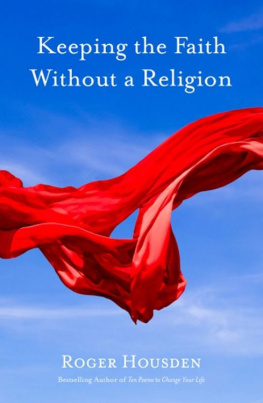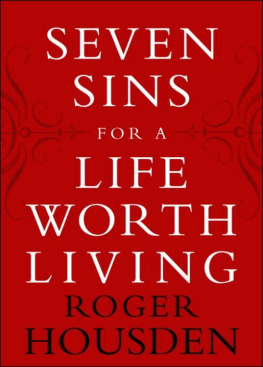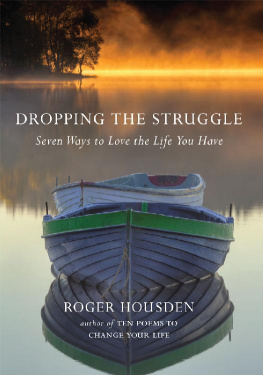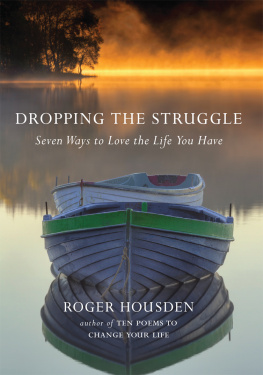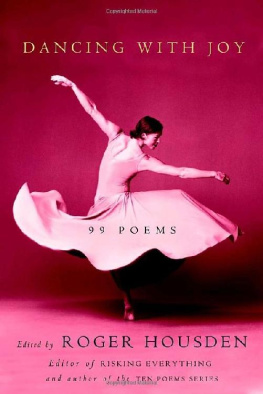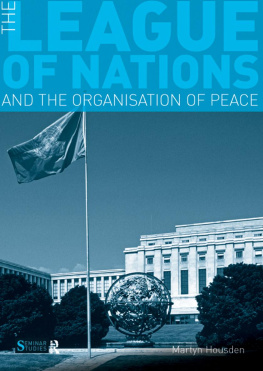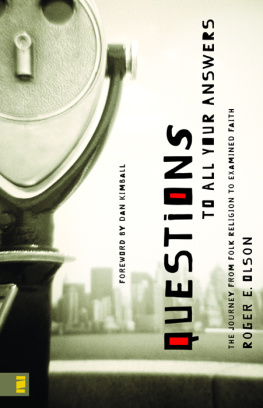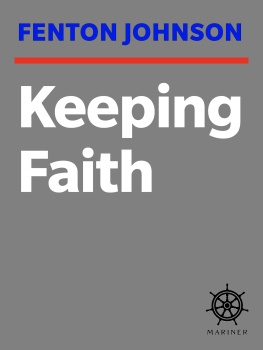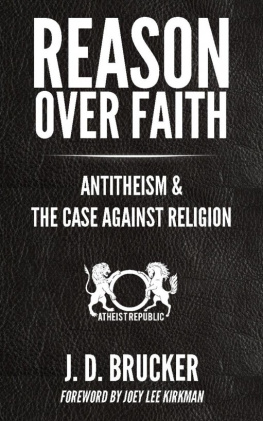Roger Housden - Keeping the Faith Without a Religion
Here you can read online Roger Housden - Keeping the Faith Without a Religion full text of the book (entire story) in english for free. Download pdf and epub, get meaning, cover and reviews about this ebook. year: 2014, publisher: Sounds True, genre: Religion. Description of the work, (preface) as well as reviews are available. Best literature library LitArk.com created for fans of good reading and offers a wide selection of genres:
Romance novel
Science fiction
Adventure
Detective
Science
History
Home and family
Prose
Art
Politics
Computer
Non-fiction
Religion
Business
Children
Humor
Choose a favorite category and find really read worthwhile books. Enjoy immersion in the world of imagination, feel the emotions of the characters or learn something new for yourself, make an fascinating discovery.
- Book:Keeping the Faith Without a Religion
- Author:
- Publisher:Sounds True
- Genre:
- Year:2014
- Rating:3 / 5
- Favourites:Add to favourites
- Your mark:
- 60
- 1
- 2
- 3
- 4
- 5
Keeping the Faith Without a Religion: summary, description and annotation
We offer to read an annotation, description, summary or preface (depends on what the author of the book "Keeping the Faith Without a Religion" wrote himself). If you haven't found the necessary information about the book — write in the comments, we will try to find it.
Keeping the Faith Without a Religion — read online for free the complete book (whole text) full work
Below is the text of the book, divided by pages. System saving the place of the last page read, allows you to conveniently read the book "Keeping the Faith Without a Religion" online for free, without having to search again every time where you left off. Put a bookmark, and you can go to the page where you finished reading at any time.
Font size:
Interval:
Bookmark:

J ust sixty years ago, Tibetan Buddhism was the most secretive religious tradition in the world. It reserved its initiations exclusively for monastics, who had to prove themselves worthy of higher teachings with decades of intensive practice locked away behind the worlds highest mountains. Now you can sign up in any small Western city for a weekend workshop that will offer you those same practices for the price of admission. And you may combine those Tibetan practices with your yoga, with your faith in Christ, with a little Zen, or with some personal combination of everything.
Old traditions have broken down everywhere and especially in the realm of religion. A 2009 Newsweek poll found that one-third of respondents said they were spiritual but not religious, up from 24 percent in 2005. In April 2010, the front page of USA Today said that 72 percent of Generation Y (those born in the late 1970s through the early 1990s) considered themselves more spiritual than religious.
These numbers are growing every day, as people continue to leave conventional religion in droves. The reasons for the desertions are multiple: sex scandals, power scandals, the inability of traditional religion to come to terms with contemporary culture and its evolving moral values, personal experience being given increasing priority over religious dogma, the development of a spiritual supermarket offering views and practices from all over the world, and both people within religious traditions and people with none swapping notes and making their own selections from the myriad spiritual options now available. Some people choose to stay within their religious tradition, but incorporate the wisdom and practices of other traditions into an understanding of their own.
Meanwhile, the sharing of therapeutic and psychological methods has become a mainstream activity, aided, for better and for worse, by media celebrities like Oprah and the dozens of yoga and meditation shows on television. The result of all of these changes is a spiritual supermarket, and shopping at it is the movement of the times.
You may rail at what you perceive to be the commercialization of religious practices and of personal stories, but its happening. And while many may trivialize what they learn into yet another easy belief system or the development of a spiritual ego that has suddenly seen the light, others are being spurred to ask questions that they may never have addressed on their own. They are drawn to take the journey inside, and for many, that journey is not just a progression toward a healthy egoinvaluable as that is in itselfbut also an opening to the transcendent dimensions of human experience.
More than ever in human history, people everywhere are on a rising curve of individuation, developing a conscious wish to deepen their relationship with their inner core. Individuation is not individualism. The latter is the pursuit of my happiness regardless of yours, and it has been on an upward trajectory ever since the old allegiances of family and tribe began to be chipped away in earnest by the Industrial Revolution. America, the land whose original inhabitants left the old allegiances behind, is the symbol of individualism the world over. Individuation, however, is a maturing authenticity that enables you to feel not separate from, but intimately connected to, others and the collective good. Individuation requires us to ask questions of ourselves rather than be content with easy answersquestions not just about our personal lives, but the larger, existential questions too, about our values, our purpose, our meaning. America is also an engine of individuation.
Those who are on the path of individuation are the most likely members of the spiritual, not religious sector of the population. These are the people for whom faith tends to be more central than belief; for whom religion has become a personal spiritual affair instead of an institution whose belief system you sign up for. People like this are not so concerned with what they believe or dont believe; they want to know how rather than whathow they can connect to a world beyond their own ego, a world of meaning and value that they intuit to be present, and yet are not always in touch with. And they are willing to use whatever works, whatever psychological or spiritual tradition it may come from, to develop what Parker J. Palmer, the Christian writer, calls habits of the heart to form that connection.
Another sign of the times is that, while traditional religions are on the wane in the West, atheism is seeing one of its periodic revivals. Its high priests are bestselling writers like Richard Dawkins, Sam Harris, and the late Christopher Hitchens. The physical universe is all there is, they say, and if there are mysteries in its workings that we do not yet understand, science will eventually unlock them with the rational application of the scientific method. Three pounds of gray matter is the source of all wonders. In refuting the supernatural in any shape or form, a rational understanding of the world also necessarily seems to eliminate the question of faith.
Yet in a debate with Hitchens a few years ago, the journalist Chris Hedges made the point that Hitchens fulminated against the irrational without admitting the existence of the nonrational. Faith, Hedges said, does not necessarily need a church, a mosque, or a synagogue. It does not need to be a faith in something or someone. Faith is a nonrational intuition of the truth, goodness, and beauty that are intrinsic to life and that lie alongside the darkness in any human heart. It is a quality of knowing that recognizes the presence of realities we may have no words for, an intuition that can spur us to actions that transcend our drive for personal gain and even survival.
More than a hundred years ago, William James noted,
[Rationalism] will fail to convince or convert you if your dumb intuitions are opposed to its conclusions. If you have intuitions at all, they come from a deeper level of your nature than the loquacious level that rationalism inhabits. Your whole subconscious life, your impulses, your faiths, your needs, your divinations, have prepared the premises, of which your consciousness now feels the weight of the result; and something in you absolutely knows that that result must be truer than any logic-chopping rationalistic talk. 

The knowing faith that James refers to is the basis of what I mean by secular spirituality. For those who consider themselves spiritual but not religious, secular spirituality is a way of living in the world according to the promptings that they hear in their hearts. For them, this knowing will take precedence over theory or dogma.
Unlike religion and atheism, the faith that lives in the heart transcends our mania for conclusions. Religion is full of definitive answers about the meaning and purpose of life meant to guide you safely from the cradle to the grave. Atheism is equally conclusive in insisting that there is no meaning or purpose to life at all and that what we see is all we get. A nonreligious faith, on the other hand, allows us to live with uncertainty, change, and ultimately, death, not because we believe that a better place awaits us, but because we intuitively sense that there is an intelligence, an inherent rightness, in the way life presents itself moment by moment. We have faith that life has its own Logos beyond all physical appearancesthat life is deeper than our minds can ever know.
Next pageFont size:
Interval:
Bookmark:
Similar books «Keeping the Faith Without a Religion»
Look at similar books to Keeping the Faith Without a Religion. We have selected literature similar in name and meaning in the hope of providing readers with more options to find new, interesting, not yet read works.
Discussion, reviews of the book Keeping the Faith Without a Religion and just readers' own opinions. Leave your comments, write what you think about the work, its meaning or the main characters. Specify what exactly you liked and what you didn't like, and why you think so.

